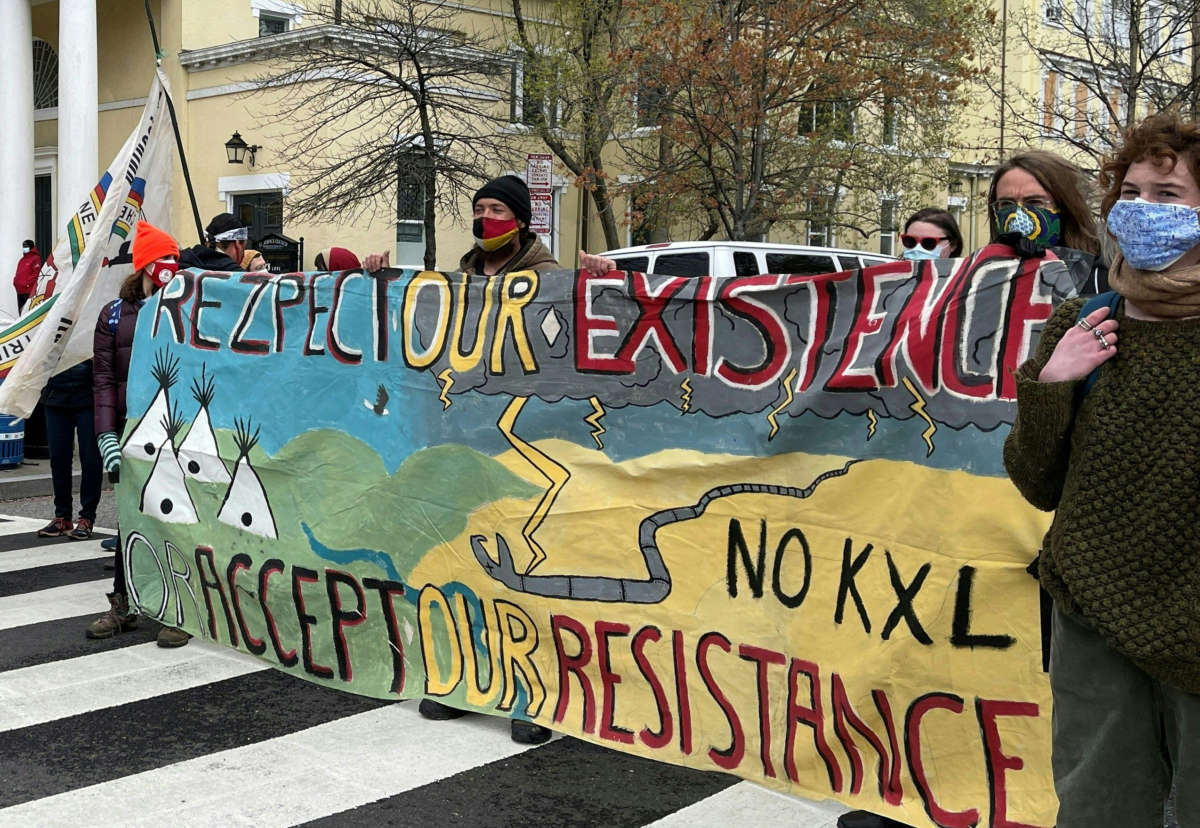Did you know that Truthout is a nonprofit and independently funded by readers like you? If you value what we do, please support our work with a donation.
On Wednesday night, the developer behind the controversial Keystone XL pipeline announced that it has officially ended the project. After over a decade of fierce protests from climate and Indigenous activists, the pipeline that served as a symbol for the destruction of the oil and gas industry is finally dead.
This is a monumental win for activists whose efforts have elevated the battle over Keystone XL to national significance. Activists have scored a few wins against the pipeline over the years — President Barack Obama had revoked the permit for the project and though Donald Trump had moved to expedite it when he was in office, on January 20, President Joe Biden revoked the project’s permit with an executive order. Now, with the statement from the pipeline’s developer TC Energy confirming the project’s “termination,” the pipeline project has finally ended.
The pipeline, which was expected to carry 800,000 barrels of crude oil a day from the Canadian tar sands, would not only have decimated the land at the point of extraction but could potentially have devastated the areas through which it ran because of the huge risk of leaks. Moreover, the pipeline’s path through numerous Indigenous tribal lands was in violation of treaty rights, Indigenous organizers who were instrumental in the fight against the pipeline had argued.
Climate advocates also argued that the pipeline would have been disastrous for the climate since the process of extracting and refining tar sands creates three to four times the amount of carbon pollution that conventional crude oil processing does.
It was the hard work of activists speaking out and lobbying politicians against Keystone XL that got Biden to sign an executive order on day one of his presidency to revoke the pipeline’s permit. Now it appears that the fierce resistance by activists likely influenced TC Energy’s decision as well, notwithstanding the company’s disingenuous attempt to greenwash its reasons for terminating the project.
The pipeline’s long-vaunted death is a major victory and a signal of widespread change in what’s been a slow but hard-fought battle against the oil and gas industry overall in the U.S. and across the globe — a fight that climate activists seem to be winning for the first time in decades.
The energy economy and political calculus seem to be turning against the fossil fuel industry as climate researchers raise ever more alarm about the devastating effects of the climate crisis and more and more organizations divest from fossil fuels. That the oil and gas companies themselves have to come to the realization that they are operating on borrowed time is evident in their deceptive attempts to present a commitment to clean energy.
The win against Keystone XL is a standout success among several claimed by the climate community over the past month and year — all spurred directly or indirectly by climate activism.
Last month, environmental activists won their case against Shell in the Netherlands, where a judge ordered the oil giant to reduce its emissions drastically in a first-of-its-kind ruling. Just a week prior to that decision, the influential International Energy Agency (IEA) — in contrast to its previous rulings — had said global powers must stop pursuing new fossil fuel projects immediately if the world is to achieve 1.5 degrees Celsius of warming or less. The IEA holds a huge sway over governments and corporations’ energy investment decisions.
Also in the past weeks, shareholders have upended business as usual at ExxonMobil by appointing three new board members who are outspoken about the oil company’s impact on the climate crisis and global emissions. Though the members make up a minority of the 12-person board, their presence represents a shift for the company that has long been at the forefront of the climate disinformation movement.
Though it was a combination of many little shifts that brought about the slow decline of the oil and gas economy, the pandemic seemed to speed it along. At one point last year, oil prices went into the negatives, which many experts predicted could be the beginning of the end for the industry.
For climate activists, however, the fight isn’t over. With the monumental death of Keystone XL, activists are already focusing on what’s next: Enbridge Line 3 and other pipeline projects that climate and Indigenous advocates have been fighting to end for years.
“The fight to stop Keystone XL was never about one pipeline. The termination of this zombie pipeline sets precedent for President Biden and polluters to stop Line 3, Dakota Access, and all fossil fuel projects,” said 350.org Keep It In the Ground Campaign Manager Kendall Mackey in a statement. “With the window of opportunity closing for meaningful climate action and clear evidence that there is no room for fossil fuel projects in bringing down emissions, this victory puts polluters and their financiers on notice: terminate your fossil fuel projects now — or a relentless mass movement will stop them for you.”
Speaking against the authoritarian crackdown
In the midst of a nationwide attack on civil liberties, Truthout urgently needs your help.
Journalism is a critical tool in the fight against Trump and his extremist agenda. The right wing knows this — that’s why they’ve taken over many legacy media publications.
But we won’t let truth be replaced by propaganda. As the Trump administration works to silence dissent, please support nonprofit independent journalism. Truthout is almost entirely funded by individual giving, so a one-time or monthly donation goes a long way. Click below to sustain our work.
